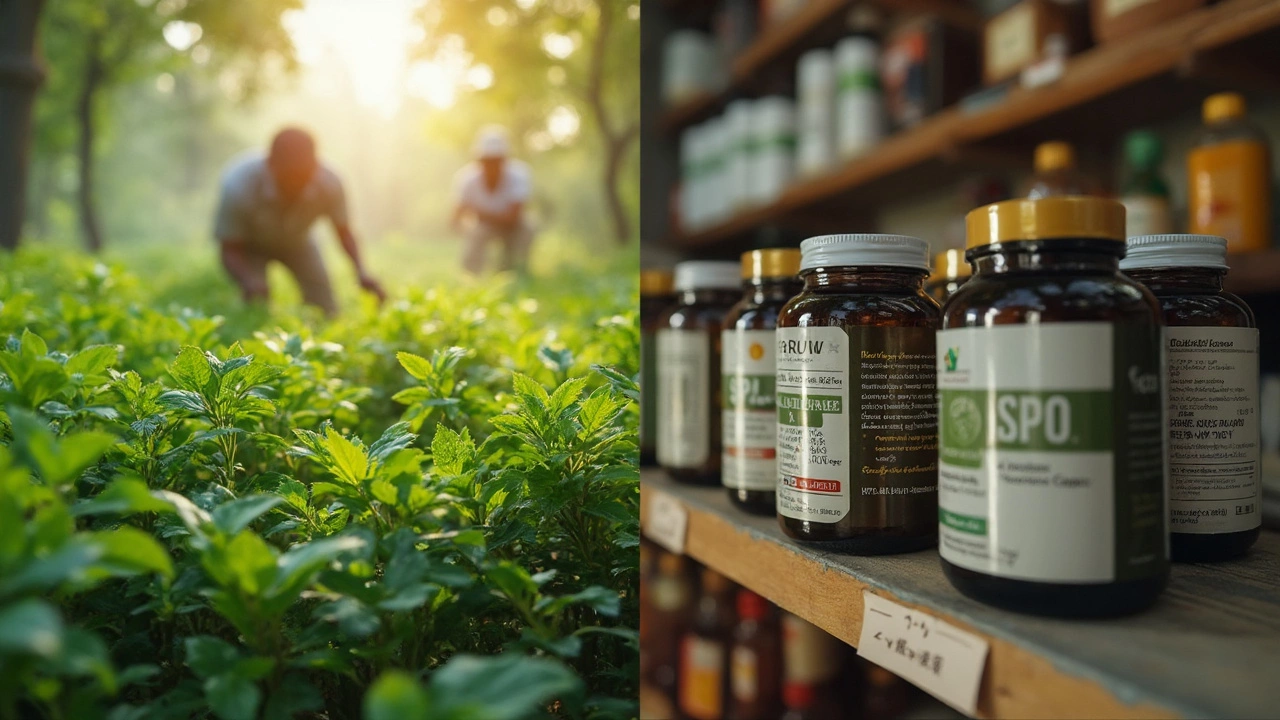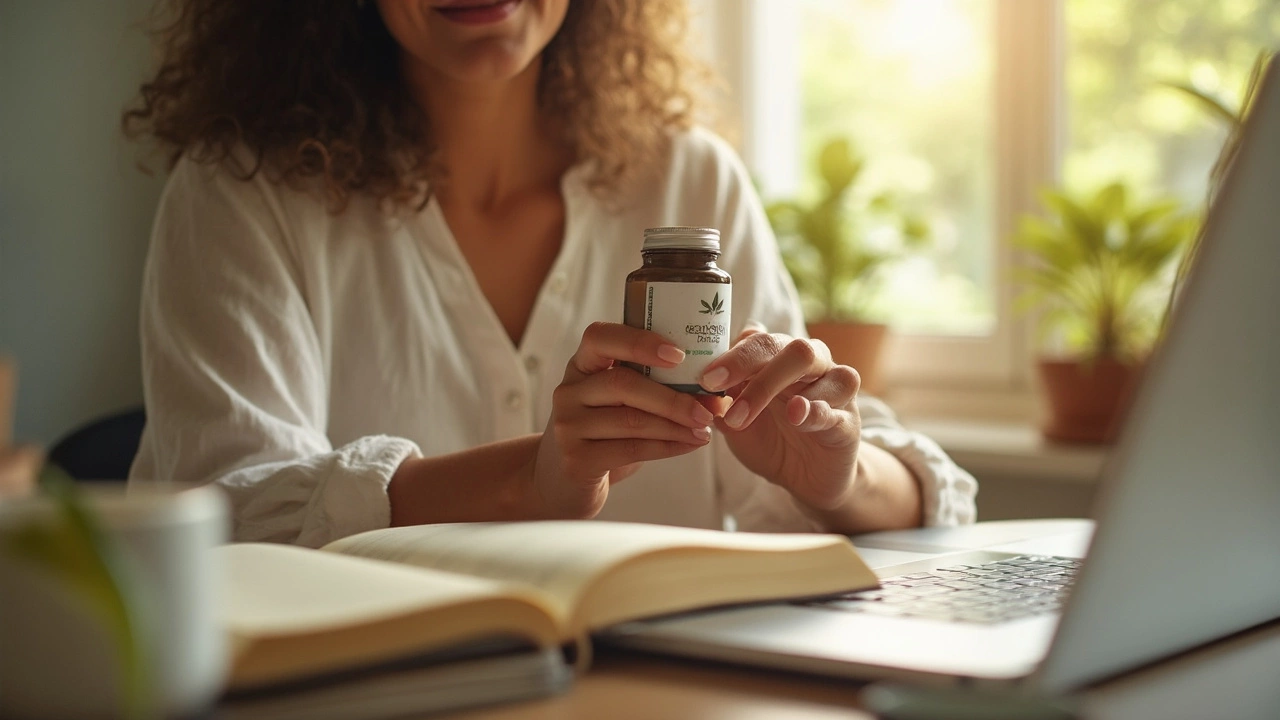Best Herbal Products: Which Company Delivers Quality?
 Apr, 30 2025
Apr, 30 2025
Walk into any health shop or scroll through Amazon, and you'll see a wall of herbal supplements—gummies, teas, capsules. But who actually makes the best stuff? The answer isn't as simple as picking the brand with the fanciest label. A company’s reputation, sourcing, and testing practices matter way more than flashy packaging or influencer hype.
If you want real results—better energy, less stress, a stronger immune system—you need products that actually contain what they promise, in safe doses. Shockingly, a couple of studies out of the U.S. and Europe found that some store-bought herbal supplements didn't even include the herb listed on the label, or were contaminated with things like heavy metals. Not great, right?
Here's what you actually want: a brand that publishes its lab results, uses quality ingredients, and is open about its sourcing. Companies worth trusting usually have certifications or third-party testing, and they’ll spell out where and how their herbs are grown. When you know what to look for, spotting the best options gets way easier. Let’s sort out which brands make the cut and what tips can keep you safe—and save you money.
- What Makes an Herbal Brand Trustworthy?
- Top-Rated Herbal Product Companies
- Hidden Red Flags in Herbal Supplements
- Tips for Picking Safe and Potent Herbs
- Real-World User Experiences and Insights
What Makes an Herbal Brand Trustworthy?
When it comes to herbal products, trust is everything. Not all companies play by the same rules. Some put quality above all else, while others cut corners and hope you won’t notice. What sets the top herbal supplement brands apart isn’t luck—it’s their standards and transparency.
Honest labeling is rule number one. If a brand says it’s got ashwagandha in the bottle, lab tests should prove that. Ever heard of third-party testing? It’s basically an independent lab checking that what’s inside the capsule matches what’s listed. The best brands will post these results online for everyone to see. In fact, ConsumerLab’s 2023 report showed that 22% of herbal supplements they tested were missing key ingredients. Yikes.
Here’s what makes a herbal company worth your money:
- Clear sourcing: A trustworthy company tells you where it gets its herbs. Look for details—country of origin, how it’s farmed, and harvested. “Organic” and “wildcrafted” are good signs.
- Third-party testing: This means an independent group double-checks for actual ingredients, plus contaminants like lead, mercury, or pesticides.
- Certifications: Things like USDA Organic, GMP (Good Manufacturing Practices), and NSF go a long way. If you see these on the label, you’re usually in solid territory.
- Ingredient transparency: Long lists of mystery additives? Big red flag. Top brands list every single ingredient, even if it’s just the capsule.
- Accessible customer support: If you’ve got questions, legit brands have real people ready to help. Their info shouldn’t be buried on the site.
Here’s a snapshot of what to look for compared to what’s a warning sign:
| Trust Factor | Good Sign | Red Flag |
|---|---|---|
| Testing | Third-party proof | No mention of testing |
| Labeling | Clear, detailed ingredients | Vague, incomplete labels |
| Sourcing | Country and method shared | No info about origin |
| Certifications | USDA, GMP, NSF, etc. | No certifications |
| Support | Easy to contact | Hard to reach, no reply |
When you see these qualities stacked up, you know a company’s serious about quality and consumer safety. As Dr. Tod Cooperman of ConsumerLab says:
"Just because an herbal supplement is on the shelf doesn’t mean it’s safe or contains what the label claims. Always check for third-party testing and clear ingredient disclosure."
Bottom line, look past the marketing. Dig into sourcing, testing, and real user feedback. The more transparent the brand, the safer your investment in herbal quality.
Top-Rated Herbal Product Companies
Picking the right herbal products starts with knowing which companies actually care about quality and safety. Not all brands are created equal, and some truly stand out in how they handle herbal supplement sourcing, formula testing, and transparency.
Gaia Herbs is a well-known name, especially if you want clean ingredients from a company that's all about transparency. They use organic farming, and you can literally track your bottle’s batch on their website. That lets you see all the tests done—pure genius if you’re particular about what goes into your body.
Another heavy hitter is Nature’s Way. They’ve been around since the late 1960s and are known for their “TRU-ID” certification. This verifies that what’s on the label is actually inside the bottle. For wallet-watchers, Nature’s Way is often more affordable than some trendy start-ups but still delivers top-notch quality.
For folks who want something even closer to how herbs are used in traditional medicine, check out Himalaya Herbal Healthcare. They have decades of research behind them and focus on sustainable farming. They also back up their products with published clinical trials—which is still rare in this space.
- NOW Foods: Offers strict third-party testing for purity and heavy metals, plus detailed info on allergens and sourcing.
- Herb Pharm: Specializes in liquid extracts and grows many of their own herbs organically on their farm in Oregon.
- Solaray: Known for clear labeling and solid quality at a fair price, good if you want basic herbal supplements without a high markup.
You might wonder if newer brands can match the big names. Sometimes they do. More companies are getting third-party certifications like NSF or USP to prove they’re legit. If you spot a bottle with those logos, it usually means the product was tested for purity, strength, and safety hazards.
| Company | Organic Sourcing | Third-Party Testing | Batch Tracking | Clinical Trials |
|---|---|---|---|---|
| Gaia Herbs | Yes | Yes | Yes | No |
| Nature's Way | Some products | Yes (TRU-ID) | No | No |
| Himalaya Herbal | Yes | Yes | No | Yes |
| NOW Foods | Some products | Yes | No | No |
| Herb Pharm | Yes | Yes | No | No |
If you want to play it safe, stick to these names or any other company with published lab results and transparent sourcing. Real quality always comes with receipts—and usually, those receipts are easy to find right on the company’s website.

Hidden Red Flags in Herbal Supplements
Spotting trouble in the world of herbal products isn’t always obvious. Some brands cut corners or hide stuff you wouldn’t want to put in your body—so it pays to know what to avoid. Here are some of the biggest red flags that show up way too often in herbal supplements:
- No Third-Party Testing: If the label or website doesn't mention independent lab checks, that’s your first clue something’s off. Third-party testing weeds out products that are fake, underdosed, or full of heavy metals.
- Sketchy Ingredient Lists: Watch for vague terms like “proprietary blend.” If it doesn't list the amount of each herb, you can’t be sure what you’re getting. Quality herbal supplement brands always spell out amounts and sources.
- Wild Health Claims: If a bottle says it cures cancer, melts off 20 pounds overnight, or ‘detoxes your liver’ with no science behind it, that's a huge warning. The FDA flags companies for this all the time because it’s not allowed and never proven.
- Missing Contact Info: Legit herbal companies want you to get in touch. No customer support number or legitimate company address? Better move on.
- Super Cheap Pricing: Real, high-quality herbs aren’t dirt cheap. If a supplement is way lower priced than others, it probably means diluted formulas, poor sourcing, or even filler ingredients.
One big study from 2022 found that almost 1 in 5 imported turmeric and ashwagandha capsules sold online contained higher than safe levels of lead—sometimes up to 10 times what's allowed by health agencies. That’s reason enough to never skip checking for quality seals and test results.
| Red Flag | What It Means |
|---|---|
| Missing Lab Testing | Possibly unsafe or weak formula |
| Hidden or Vague Ingredients | Unknown dosages or cheap fillers |
| Unreal Health Promises | Likely breaking rules, might not work |
| No Real Company Info | Little to no accountability |
| Suspiciously Cheap Price | Could be low quality or contaminated |
Bottom line: Don’t trust what you can’t double-check. Look for those third-party seals, clear labels, and prices that seem, well, reasonable. Your health’s worth more than guessing with random herbal products.
Tips for Picking Safe and Potent Herbs
If you're lost in the sea of herbal products, you’re not alone. Choosing the right supplement comes down to more than just reading the front of the bottle. Here’s how you can avoid duds and pick what's actually safe and works as promised.
Check for third-party testing. If a company lets an outside lab check their stuff, that’s a great sign. Look for seals like USP, NSF, or ConsumerLab on the packaging or website. This testing means what’s on the label is actually inside, and you’re not getting unwanted extras.
- Pick brands with clear ingredient sourcing. You want details, not just “contains ashwagandha.” Top herbal supplement brands often tell you where their herbs grow (like India for tulsi or the U.S. for echinacea).
- Avoid blends that hide ingredient amounts. “Proprietary blends” leave you guessing about how much of each herb you’re actually getting—usually it’s not much.
- Check for transparent expiration dates and batch numbers. This tells you the product is fresh and traceable if there’s ever a recall.
- Scan for common certifications. USDA Organic, Non-GMO Project Verified, and cGMP (current Good Manufacturing Practices) all mean higher standards are being met.
- Read recent customer reviews, not just ratings. Look for mentions of obvious effects, taste, or weird side effects. Fake reviews tend to be super generic.
Some quick facts to keep in mind:
| Key Factor | Why It Matters |
|---|---|
| Third-Party Testing | Ensures no heavy metals or fillers, label matches contents |
| Country of Origin | Helps avoid herbs from polluted or unregulated areas |
| Full Ingredient List | Know exactly what you’re putting in your body |
If you’re trying something new, go for a single-ingredient product first. That way, if you feel off, you’ll know what caused it—and you get a higher dose of what you actually want. And remember: price does not always mean quality. Some of the best natural supplements are reasonably priced when brands skip useless extras and focus on what matters.

Real-World User Experiences and Insights
Nothing beats honest feedback from people who've actually used different herbal products. Reddit threads, product reviews, and YouTube videos are packed with tips and warnings about popular brands. When it comes to herbal supplement brands like Gaia Herbs, NOW Foods, and Nature’s Way, patterns start to show up pretty quickly.
For example, Gaia Herbs gets a lot of love for its transparency. Users appreciate seeing batch-specific testing results on their website. Lots of regular buyers mention that their Echinacea and Ashwagandha supplements work consistently for immune support and stress, so it’s not just marketing fluff. On the flip side, some people complain about price hikes with trusted brands, so it’s a good idea to keep an eye out for discounts or sales.
NOW Foods stands out for budget-friendly options that still check boxes for quality. It’s not as fancy as some boutique brands, but users notice real results for things like sleep and mood. Reviewers do mention a strong taste or smell in some products—that’s the downside of less processing but also a sign you’re actually getting herbs instead of just fillers.
One red flag users often call out: unclear labeling or missing herbal quality certifications. People tend to trust brands that use third-party testing, like ConsumerLab or NSF. Check customer reviews before you buy—folks are quick to point out if a product made them feel weird, didn’t work at all, or smelled off.
- Look for patterns in user reports—if lots of people get great results or no effect, that’s valuable info.
- If a product causes side effects and you see others mentioning the same, skip it.
- Noticed a recalled lot number? A quick search or crowdsourced review will clue you in.
Curious how these companies really stack up on customer satisfaction? Here’s a look at ratings and reports from over 2,000 Amazon and iHerb reviews:
| Brand | Average Rating (out of 5) | Key Praise | Common Complaint |
|---|---|---|---|
| Gaia Herbs | 4.7 | Consistent results, clean sourcing | Price |
| NOW Foods | 4.5 | Affordable, reliable | Taste/smell |
| Nature’s Way | 4.4 | Wide variety, easy to find | Some blends underdosed |
User feedback matters because it shows what you can’t learn from glossy ads or labels. Look for patterns, trust brands that are honest about their processes, and don’t ignore red flags from people who’ve already taken the plunge.